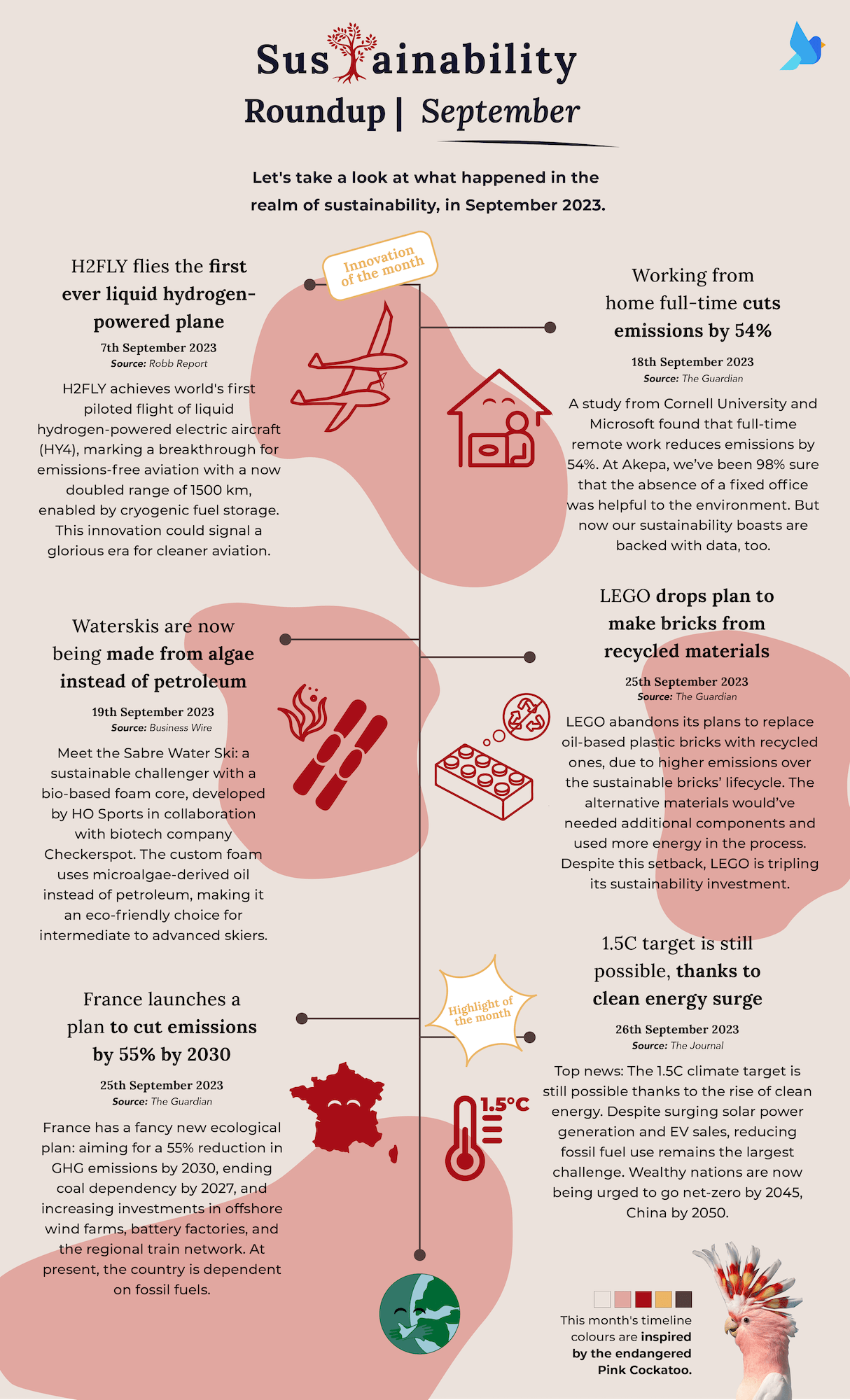Whatever your thoughts on sustainability, it’s fair to say there’s a quantity of it around – but it’s not always as wholesome as it looks. Enter Akepa: we dart into the shifting distance like a pack of trained herbivorous hounds to retrieve the finest green shoots for you. Every month. And we’ve just got back…
This month’s timeline colours are a paean to the pink cockatoo. A spunky, clever, and rather cute bird but also an endangered one. It lives in tree hollows but those are being destroyed by land clearing and it’s running out of places to bring to life…
H2FLY flies the first ever liquid hydrogen-powered plane
September 7th, 2023
Link: Robb Report
Aviation appears to be on the verge of a new golden era that will be defined by lower emissions. It’s not so long ago that we wrote about the Airlander 10, a passenger zeppelin that will fly between Barcelona and Majorca from 2026. Right over our heads…

And now there are more promising signs from the sky. H2FLY has just completed the world’s first piloted flight of an electric aircraft powered by liquid hydrogen (HY4).
Why is this so exciting? Well, firstly because liquid hydrogen fuel releases zero emissions. And secondly, because H2FLY’s jaunts in their new aircraft also demonstrated the viability of these flights over a range that has doubled from 750 km to 1500 km.
The key to the increased range is cryogenically storing the fuel instead of using gas. Perhaps the plane’s zany shape has something to do with this.
Bring on the new aviation age.
Working from home cuts emissions by 54%
September 18th, 2023
Link: The Guardian
Is the remote work revolution still gathering pace? We haven’t looked at the stats but we can say that many of Akepa’s friends have had their WFH privileges rescinded, bit by bit, post pandemic. WTF!

Akepa is still resolutely a remote-work company, though. We will never have an office and one of our arguments for this is that it’s better for the environment. Yet, we do admit to some slightly shaky conviction about this. It makes sense in theory but what about the data?
Well here’s some data: a comprehensive study from Cornell University and Microsoft has revealed that WFH, all the time, reduces emissions by 54%*. There are also lesser benefits from those who work remotely, some of the time.
Akepa can now breathe a sigh of relief – especially since we do espouse the emissions benefits of remote work quite enthusiastically on our sustainability page.
*There are quite a few caveats – read about them at the full link above.
Bio-based foam in HO Sports’ new waterskis
September 19th, 2023
Link: Business Wire
Wherever fossil fuels are concerned, less is always a good thing. This time it’s the water sports industry that’s showing some nice signs of progress in the movement towards alternative materials.
Leading industry manufacturer HO Sports has announced the launch of their newest sustainable product: the Sabre Water Ski. What makes it sustainable you ask? Well, it uses a bio-based foam core.

Like many developments similar to this, HO Sports didn’t do it alone. They worked together with Californian biotech company Checkerspot to develop the custom foam, which has an estimated 42% bio-carbon content and uses a special oil derived from microalgae (if seaweed comes to mind, you’re in the right headspace). Traditional foams are made using petroleum.
Take note that these eco-conscious skis are designed specifically for intermediate to advanced skiers, so don’t be surprised if your local watersports shack isn’t offering them to newbies just yet.
Lego drops plan to make bricks from recycled materials
September 25th, 2023
Link: The Guardian
Sustainability is hard. Just pinning the term down is tricky enough, never mind the perils and paradoxes when reimagining a classic formula.

Just ask Lego. The brand has halted a project to replace its oil-based plastic bricks with ones made from recycled plastic. The new bricks, despite sounding nicer, would’ve resulted in higher emissions over their lifecycle.
Tim Brooks, the head of sustainability at Lego, compared the challenge to constructing a bicycle from wood instead of steel. He highlighted that the non-oil-based material, being softer, required additional components for enhanced durability, along with increased energy for processing and drying.
Nevertheless, it’s reassuring to know that Lego did the math. And with the company tripling investment in sustainability to 350bn Danish Krone, the pieces will surely click together with future projects.
France launches ‘groundbreaking’ ecological plan
September 25th, 2023
Link: The Guardian
Groundbreaking and lengthy, one might say.
French President Emmanuel Macron introduced a 50-point, national, ecological plan. Highlights include a reduction in greenhouse gas emissions by 55% (compared to 1990 levels) by 2030 and a total detente to coal dependency for electricity production by 2027. Then you’ve got new projects for offshore wind farms, electricity battery factories, and a statement investment in the regional train network to the tune of 700 million euros.

Despite France’s pretty decent reputation in terms of sustainability (they currently rank 6th on the Global SDG Index), they’re surprisingly dependent – 60% to be exact – on fossil fuels.
But one thing is to set goals, another is to achieve them. Let’s hope the extra 10 billion euros, being added on top of the previous budget, reels in some tangible change in the coming years. The last thing anyone wants are delayed – or worse, false – promises.
1.5c still within reach due to clean energy surge
September 26th, 2023
Link: The Journal
When there’s corporate pushback and flimsy commitments, it’s hard to believe the 1.5C target is still possible. But there’s hope. The climate threshold is still possible thanks to the growth of clean energy.
The International Energy Agency (IEA) announced the news with a few words of warning, of course. Wealthy nations need to go net zero by 2045, so 5 years earlier, while China needs to do this by 2050, a whole decade earlier. And despite increases in solar power generation and EV sales, there’s still work to be done to lower the use of fossil fuels, as investments continue to come and emissions remain high. The silver lining is that world demand for oil, gas, and coal, is forecasted to peak this decade.
Overall, countries need to do more in terms of policy and regulation to accelerate the clean energy transition. Might we suggest taking something out of France’s playbook?
We’d love to say more but these are hard enough to put together as it is. We’ll be back next month. Hasta pronto.




Leave a Reply